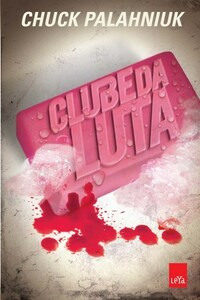You need to sign in or sign up before continuing.
Take a photo of a barcode or cover
I read this book because I watched the movie and felt like I was missing something. Honestly, my opinion is that you get the same out of both, and I still felt like I was missing something. I feel I understand the message, but the writing style (though much easier to follow than "I'm Thinking of Ending Things, which I read just before this) left me feeling lost and unsatisfied. I'm not sure I would have been able to follow the plot if I hadn't seen the movie. Maybe this just means I'm a bad reader. Really I just don't have the patience for stream of consciousness writing.
As for the actual content of the book, I was reminded of two Sondheim musicals, Sweeney Todd and Assassins. During Fight Club, much like during these musicals, you find yourself agreeing with the character's philosophies--that the world is a damaging and unjust place--but then are immediately horrified at your agreement because of the violent reactions of the characters to these problems. You don't want to think you agreed with a murderer or an anarchist. I prefer the execution (pun intended) of Sweeney Todd as a story, but there is similar food for thought in Fight Club.
As for the actual content of the book, I was reminded of two Sondheim musicals, Sweeney Todd and Assassins. During Fight Club, much like during these musicals, you find yourself agreeing with the character's philosophies--that the world is a damaging and unjust place--but then are immediately horrified at your agreement because of the violent reactions of the characters to these problems. You don't want to think you agreed with a murderer or an anarchist. I prefer the execution (pun intended) of Sweeney Todd as a story, but there is similar food for thought in Fight Club.
dark
funny
mysterious
tense
fast-paced
Plot or Character Driven:
Character
Strong character development:
Complicated
Loveable characters:
No
Diverse cast of characters:
No
Flaws of characters a main focus:
Yes
The plot is insane and perfectly fits together like puzzle pieces. Truly incredibly written, another one of those books I wish I could read for the first time again.
emotional
fast-paced
Plot or Character Driven:
Character
Strong character development:
Complicated
Loveable characters:
No
Diverse cast of characters:
No
Flaws of characters a main focus:
Yes
3.5 ⭐️
It was decent but I suppose having seen the film was slightly ruined for me.
It was decent but I suppose having seen the film was slightly ruined for me.
Les contaría lo mucho que me encantó éste libro, pero la primera regla del club de la lucha es que nadie habla del club de la lucha —y no quiero romper la regla, le tengo miedito a Tyler—.
PD: Lo unico que puedo decir es que si eres fanático (como yo) de los giros finales inesperados, tipo Sexto Sentido, esos que te dejan pensando un rato "¿cómo no me di cuenta?", entonces TIENES que leer éste libro.
PD: Lo unico que puedo decir es que si eres fanático (como yo) de los giros finales inesperados, tipo Sexto Sentido, esos que te dejan pensando un rato "¿cómo no me di cuenta?", entonces TIENES que leer éste libro.
fast-paced
Flaws of characters a main focus:
Yes
You are not a beautiful and unique snowflake. You are the same decaying organic matter as everyone else, and we are all part of the same compost pile.
Entertaining, enjoyable read. I liked the tone and style of it. I kept wishing that I could read this blank slate, but having seen the movie and years of Fight Club being part of the pop culture background drone made that impossible. Experiencing this without knowing the twist must be really fun, but it was still an enjoyable read despite it.
The fight goes on and on and on as long as it has to.
There’s a queer reading of this to be done, and which I’m sure has been done, by more astute minds than mine. Something about living a double life as an idealized version of yourself, a very masculine man, going by another name, as a means to escape your boring, depressing life, and fighting against this part of yourself, resisting it, endlessly, just smacks of gender, to me, at least. I giggled a bit during the chemical burn scene, when Tyler kisses the narrator’s hand and thought, I’m not queer, I’m disembodied. Literally!
I wonder if the whole “calling people snowflake” as an insult emerged out Fight Club. It’s funny, but not surprising, that conservatives would take hold of that, and completely ignore the second part of the sentiment, that you’re not special because we’re all the same. We’re all stuck in this awful shit pile of our material reality. We’ve all been lied to and sold this fake dream that’s unattainable and unfulfilling. There’s a baseline of empathy and solidarity there, if you care to look for it. A book with politics very much of its time. Gen X is so funny. Classic example of naming the symptoms but getting the core problem wrong.
dark
emotional
tense
fast-paced
Plot or Character Driven:
A mix
Strong character development:
Yes
Loveable characters:
No
Diverse cast of characters:
N/A
Flaws of characters a main focus:
Yes
"Only when you've lost everything, you're free to do anything."
No doubt, Tyler Durden, is one the most influential literary character. Fight Club redefines masculinity and revolution. It puts new forward a new philosophy of life which is a bit odd and radical. But as a piece of literature, it's one of the best book written. I would recommend anyone about 16 to read it. BUT not to take EVERYTHING in it seriously (a humble request).
No doubt, Tyler Durden, is one the most influential literary character. Fight Club redefines masculinity and revolution. It puts new forward a new philosophy of life which is a bit odd and radical. But as a piece of literature, it's one of the best book written. I would recommend anyone about 16 to read it. BUT not to take EVERYTHING in it seriously (a humble request).
It's one of those rare cases where the movie is better than the book.
But interesting nonetheless
But interesting nonetheless
As one of my favourite movies of all-time, the experience is probably always going to be a positive one. It’s interesting that this starts at the end, just like the film, but gives away the main twist. I kind of dug it though, because it makes you instantly question everything, which you ought to, and probably wouldn’t have done otherwise. I’d wager a large portion of the film is verbatim too. Most scenes I could see in my head play out even as I read them, and there wasn’t that much additional context being added beyond that.
For such a solipsistic, unreliable narrator, he spends a lot of time saying what is happening, with little interiority. It’s a very cinematic novel. Just like the film, the book seems to also get a lot of readers that don’t understand the satirical nature of it. It is an indictment of toxic masculinity and an acknowledgement of how young boys, just like the narrator, and those others like him who join, who become susceptible to recruitment through tapping into this generational underlying anger. There’s enough empathy and biting criticism that it evens out, not giving a black and white theme or message. Rather, it endeavours to provide a kind of power fantasy and show just how grotesque it is. Not to mention how the narrator themselves could have been fractured to that point to begin with. It’s a terrible cycle that just keeps repeating, co-opting culture and young men—unless, as we see, there’s some manner of intervention.
I do think the movie surpasses the source material, though. But only because the book is written in such a way as to not offer more than the movie, and the movie having a structure that’s more appealing—possibly more thought provoking (depending on the viewer anyway; reading reviews of the movie show some people have no idea what it’s actually about).
For such a solipsistic, unreliable narrator, he spends a lot of time saying what is happening, with little interiority. It’s a very cinematic novel. Just like the film, the book seems to also get a lot of readers that don’t understand the satirical nature of it. It is an indictment of toxic masculinity and an acknowledgement of how young boys, just like the narrator, and those others like him who join, who become susceptible to recruitment through tapping into this generational underlying anger. There’s enough empathy and biting criticism that it evens out, not giving a black and white theme or message. Rather, it endeavours to provide a kind of power fantasy and show just how grotesque it is. Not to mention how the narrator themselves could have been fractured to that point to begin with. It’s a terrible cycle that just keeps repeating, co-opting culture and young men—unless, as we see, there’s some manner of intervention.
I do think the movie surpasses the source material, though. But only because the book is written in such a way as to not offer more than the movie, and the movie having a structure that’s more appealing—possibly more thought provoking (depending on the viewer anyway; reading reviews of the movie show some people have no idea what it’s actually about).





